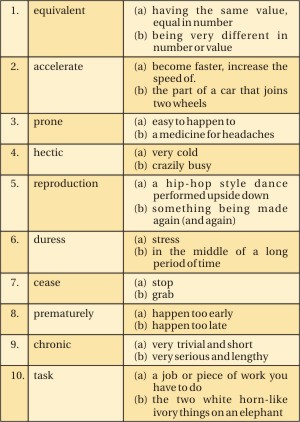|
Education


Look in the dictionary to find the
word family of the word 'stress'. Share what you find with
your friends and talk briefly about whether these words apply
to you.
DEFINITIONS: match the following words with
the definitions:

TRUE/FALSE:
predict whether the following statements about the article
are true or false:
(a)
Stress can reduce your lifespan. T / F
(b) Stress decelerates the aging of our cells T / F
(c) Stress makes us more prone to age-related diseases. T
/ F
(d) People with hectic lifestyles are more likely to live
longer T / F
(e) Our body's system of cell reproduction gets faster because
of stress. T / F
(f) We age because of something connected with our DNA called
telomeres. T / F
(g) Having very short telomeres means we live longer. T /
F
(h) Having children makes you die early. T / F
(i) We may soon be able to measure our stress levels. T /
F
Now
read the article and check your predictions.
Get
Stressed, Get Old |
It's
official. Stress can take ten years off your life. That's
the conclusion from researchers at the University of
California, who have been studying the affect of stress
levels on the body. They found that stress accelerates
the aging of our cells, which makes us more prone to
age-related diseases. This is bad news for people with
stressful jobs and hectic lifestyles as they are more
likely to die earlier than less-stressed people. It's
a message for us all to slow down and take things easier.
The researchers discovered in their tests that the system
of cell reproduction and replacement, which of course
keeps us going, becomes faster under duress. Each time
a cell in our body is replaced, part of our DNA, called
telomeres, shorten. When these telomores become too
short, cells cease reproducing and our bodies continue
the aging process. This means longer telomeres lengthen
our lives. Stress makes them shorter, and so we die
prematurely. The simple message, therefore, is to take
life easy.
Research leader, Dr. Elissa Epel, compared 39 women
who looked after children with chronic illnesses with
a 'control' group of 19 mothers of healthy children.
The length of the life-giving telomeres was then measured
in their blood. The women who had the more stressful
task of caring for chronically ill children aged the
equivalent of ten years compared with the other women.
Their stress levels caused them to age faster. It has
always been common knowledge that stress kills. Now
we may soon be able to measure how dangerous our careers
and lifestyles really are. |
PHRASE
MATCH: think about the article and match the following phrases
taken from the text:

COLLOCATION:
Match the words which go together:

Discuss
the following ideas with a friend
1. What are some of the most common causes of stress?
2. What are some early signs of stress?
3. How do you tend to react to stress?
4. How does stress affect your body and health?
5. What are some of the most stressful life events?

Copyright
(R) thedailystar.net 2005 |
